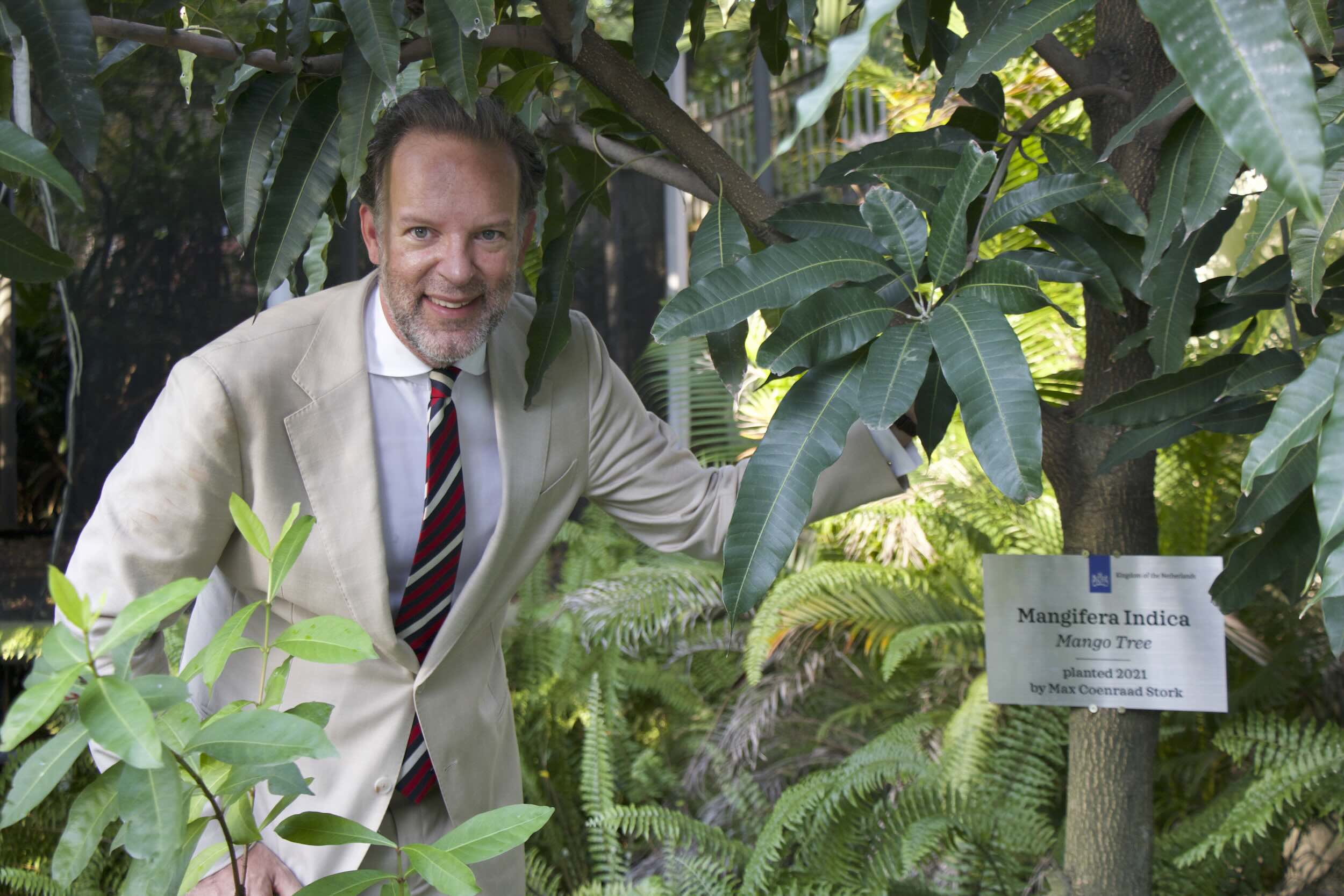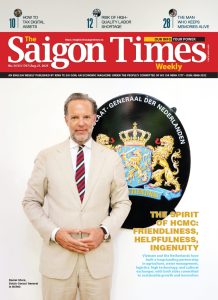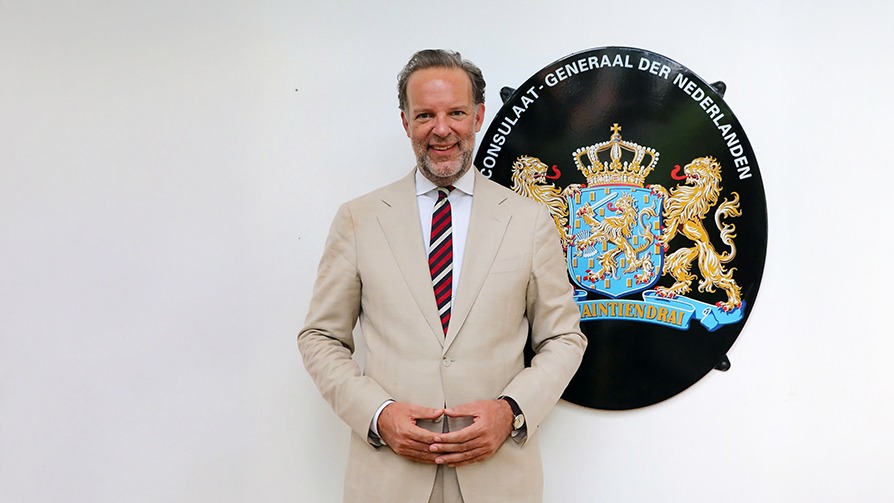Vietnam and the Netherlands have built a longstanding partnership in agriculture, water management, logistics, high technology, and cultural exchanges, with both sides committed to sustainable growth and innovation. In an interview with The Saigon Times, Dutch Consul General Daniel Stork shared his views on HCMC and reflected on the spirit of cooperation that continues to strengthen ties between the two countries.
The Saigon Times: During your time in HCMC, what has impressed you the most?
Consul General Daniel Stork: I arrived in HCMC on the 12th of September 2021. That was actually the first flight back after Covid-19, and that was when the city opened up again. So my first impression of HCMC was, uh, the heat, because I came from Europe. So it was the heat, the humidity, and of course the tropical air. And then I think the impression of the city was one of energy, of optimism, of people moving forward. And this was at the time when the city was still very quiet, but you could feel that there was a sense of moving forward.
And then what struck me personally is that, you know, having grown up in Cuba, in the tropics, in another socialist country, I also felt a very strong sense of solidarity, of people caring for each other, of people being close to each other, of people being warm and open to each other. That is what I have experienced during my entire time here. And I think that is what has impressed me the most — the warmth of the people, the openness of the people, the friendliness, the hospitality, the optimism. And of course, the warmth in the air is something that I will never forget.

Could you highlight a few key projects or initiatives that best represent the partnership between the Netherlands and HCMC?
I think the relationship between the Netherlands and HCMC and Vietnam in general goes back more than 400 years. So it is a very long-standing relationship. I think there are a few pillars that are very strong in that relationship. One is agriculture. The Netherlands is the second largest exporter of agricultural products in the world, after the United States. We are a small country, so we have to do that with technology.
I think in Vietnam, we have been working a lot with agriculture, with agricultural technology, with seeds. We sometimes call them the Rolls Royce of seeds, because they are so high quality, and they can withstand drought, they can withstand saline water, and they can produce high yields. In agrofood, Dutch companies such as Heineken, Nedspice, Rijk Zwaan, East West Seed, Bejo, Fruit Republic, FrieslandCampina, IDH and SNV are also playing important roles.
The second area is water. The Netherlands and Vietnam are both delta countries, so we both have to deal with water. We have been working together on water management for many years. I think the relationship between Rotterdam and HCMC is a very good example of that. It is about urban resilience, it is about flood management, and it is about making sure that the city is ready for the future.
The third area is logistics. The Netherlands is the gateway to Europe, and HCMC is the gateway to Southeast Asia. We have been working together on logistics, on the development of the seaports, and on the development of Long Thanh airport. Dutch companies active in this space include Damen, STC, IHC, Van der Leun, APM, Schiphol Group, NACO, Haskoning, Vanderlande, Signify, Akzo Nobel, Hunter Douglas and more.
The fourth and relatively new area is high-tech, particularly the semiconductor industry. We have seen Dutch companies such as BE Semiconductor Industries (BESI), Lucassen Precision Asia, and Sioux Technologies VDL investing in HCMC and Danang, while NXP Semiconductors, Tecnotion, and VDL ETG Vietnam have established their presence in the north. This is a sector with great potential, where we can achieve much more in the future.
And then there is, of course, the people-to-people contacts. Many Vietnamese have studied in the Netherlands, and that is very important because it creates a bond between our two countries.
And culture. We have done a lot of cultural activities. Last year, we had a big bicycle tour, with about 800 people cycling through the city. This year, we had two cyclists who cycled from the Netherlands to HCMC. We used those events to talk about green infrastructure, about cycling, about integrating cycling with the metro, about making the city greener. We have also promoted Vietnamese artists who have studied in the Netherlands and who have won awards.
The Netherlands is known for its expertise in water management and sustainable agriculture. What potential do you see for deeper collaboration in these areas?
Well, I think the Mekong Delta is a very important area for both our countries. It is the agricultural heart of Vietnam, and it is very similar to the delta in the Netherlands. So we have a natural connection there. We have been working together on how to adapt agriculture to saline water, how to use water more efficiently, and how to make sure that farmers can continue to produce in the future.
We have also been working on the Mekong Delta Master Plan, together with the Ministry of Agriculture and with the Prime Minister, which looks at how to integrate water management, agriculture, and logistics in one plan. I think that is a very good example of how we can work together.
Here in HCMC, we have also been working on flood management, on how to make sure that the city can cope with heavy rainfall and rising sea levels. In agriculture, we are working with companies like Cô Gái Hà Lan, De Heus, Nutreco, and seed companies to bring technology to the farmers.
Which sectors hold the greatest promise for future economic cooperation?
I think high tech is very important, because it is an area where Vietnam wants to develop, and where the Netherlands has a lot of expertise. High tech also requires education, so I think education is going to be very important as well.
Agriculture will continue to be important, because it is not only about feeding the people of Vietnam, but also about exporting to other countries — China, Malaysia, Singapore, and beyond. I think we will see more demand for healthy food, for organic food, for food that is produced with fewer antibiotics, fewer pesticides.
Coffee is a good example. The European Union has a new deforestation regulation, which means that coffee imported into the EU has to be produced without cutting down forests. So, we are working with farmers to help them meet those requirements. And the same goes for textiles — the EU is also looking at labor conditions, so that is another area where we can work together.

It is worth mentioning that the Netherlands is the number one export destination in Europe for Vietnam, the number one European investor in Vietnam, and the number one European trade partner of Vietnam. So, we have a very strong base to build on.
In what ways has the Dutch Government supported Vietnam’s green transition and climate resilience?
Well, I think it is about thinking long-term, about sustainability, about making sure that what we do today does not harm the future. We work with the Dutch Business Association Vietnam, which has about 170 members, many of them active in green technology.
One example is a big company that signed an agreement with our government to put solar panels on all 17 of its animal feed factories in Vietnam. That was done with Dutch subsidies, so that is green energy being produced here in Vietnam.
Another example is coffee production in Dak Lak, where we are helping farmers to plant papaya and cashew alongside coffee, so that the soil stays fertile longer.
In shrimp farming, we are working on reducing the use of antibiotics and reducing diseases, so that the shrimp is healthier for consumers and can be exported to more markets.
And of course, we have been involved in planning, like the Mekong Delta Master Plan, and in flood management projects here in HCMC.
Is there anything you wish you had more time to accomplish before the end of your term?
Well, a diplomat’s work is never finished. I wish I had learned Vietnamese better — I speak ten languages, but Vietnamese is a very difficult language. At my farewell, I sang “Sài Gòn đẹp lắm” as a little tribute. I wore my father’s tie from the 1960s, because he lived and worked in Vietnam in the late 60s and early 70s. So it was a personal moment for me.
I would have liked to bring more Dutch companies to Vietnam, to do more cultural exchanges. But we have had some wonderful events — the 50th anniversary of diplomatic relations, a fashion show at the Independence Palace, and a public program with Chairman of the National Assembly’s Economic and Financial Committee Phan Van Mai.
What are your plans after leaving your post in Vietnam?
We will leave on a Friday evening. My wife, who is also a diplomat and has been working for the United Nations Development Programme in Hanoi, will go to the Ministry of Foreign Affairs in Amsterdam to work on food security. I will go to Ramallah, in the Palestinian Territories, as Deputy Head of Mission for one year.
Wherever I go, the goal is the same — to bring people together, to help people understand each other, to make connections.
If you could leave one message for the people of HCMC, what would it be?
Cảm ơn. Thank you for your warmth, your kindness, your resilience.
I will never forget one night when I had a flat tire in Binh Thanh at one o’clock in the morning. A street vendor pointed me to a house across the intersection. The father came out, started his generator, and fixed my tire in fifteen minutes — fair price, no fuss. That is the spirit of this city — friendliness, helpfulness, ingenuity, hard work, and honesty.
Thank you for the karaoke nights, for sailing on the Sài Gòn River, for the openness and energy. And thank you for the visa-free decision for Dutch visitors — it is another bridge between us.
Receiving the HCMC medal from Chairman Nguyen Van Duoc was an enormous honor. I will carry it with me, and I will carry all the memories with me, wherever I go.
Reported by The Ky









